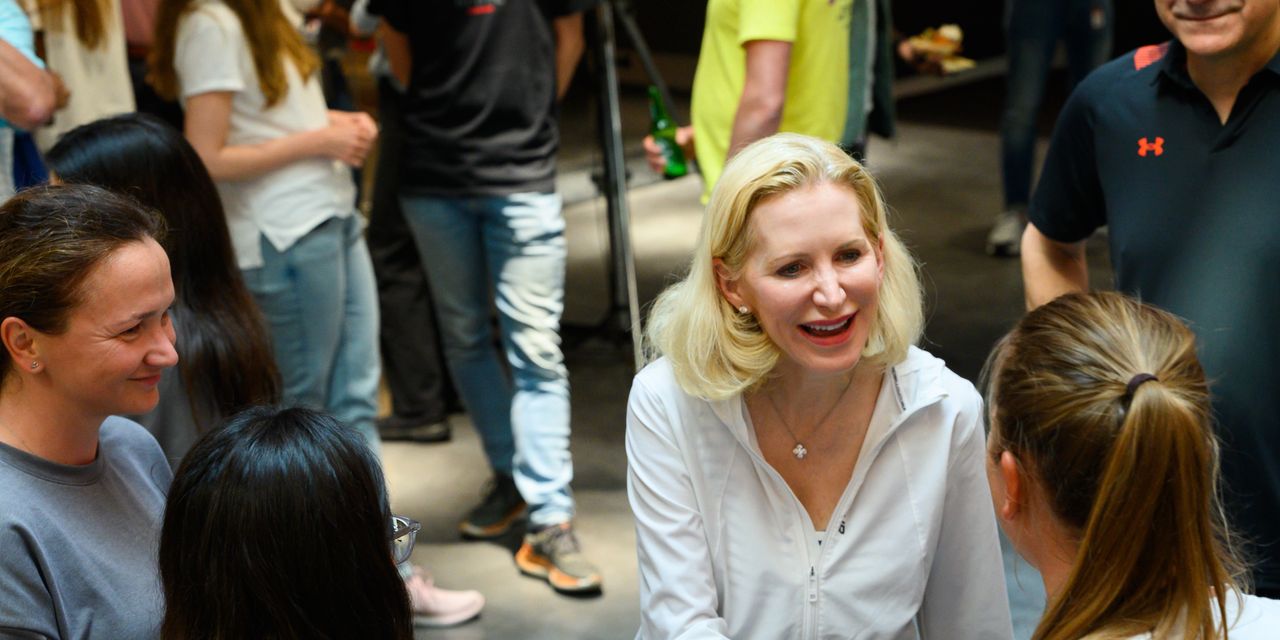Under Armour Inc. derives less than a quarter of its sales from women’s products, but the company is looking to capitalize on a rapidly growing market opportunity.
“Women are 50% of the population, so there’s absolutely no reason that we cannot get close to that number as a percentage of our overall sales over time,” Chief Executive Stephanie Linnartz told MarketWatch.
And there are more chances than ever to sell female sportswear products, she said, as women’s college and professional teams expand their fan bases. Just look at the University of Nebraska’s women’s volleyball team, which packed a record 90,000-plus fans into the school’s football stadium for a match earlier this year.
Linnartz made history when she took over the CEO position in February, becoming not only the first woman to lead Under Armour
UA,
UAA,
but the first woman to helm any major sports brand. In speaking on her first earnings call earlier this year, she vowed to “go after women harder than this company has ever seen.”
One component of Under Armour’s new strategy is a focus on “sportstyle” products, or those that mix performance and fashion through finish, fabrics and trim. “This is really going to have a tremendous boost to our business with women,” Linnartz said in a recent interview with MarketWatch.
Read: Under Armour’s new CEO says women will be a key target customer
The emphasis on “sportstyle” also ties in with Under Armour’s goal of increasing its “brand heat,” a term Linnartz uses to describe the company’s resonance with customers. “The lagging indicator is really around growing sales, but well before that, it’s when you see influencers wearing your apparel and your footwear, and you know that you are being really loved,” she said.
Linnartz knows plenty about building customer loyalty, having spent 25 years at Marriott International Inc.
MAR,
most recently as the hotel chain’s president. Hospitality was “all about building brand love, about building brand loyalty, about really developing those deep connections with consumers,” she said, and “the exact same premise” applies to Under Armour.
Don’t miss: Shoppers will spend more than ever on holiday gifts online. But here’s where they might cut back to make it work.
That said, transitioning to a different industry required new lessons, and Linnartz talked with employees, retail partners, athletes, athletic directors and others before taking on the job. She also took advantage of “reverse mentorship” within Under Armour, leaning on the knowledge of younger colleagues.
“I have found that some of the best learnings I’ve had over the course of my career have come from people who were younger than me or more junior in their career, because they know something more about the latest digital technology, let’s say, and they can teach me and I can learn from them and I can share my learnings with them,” she said.
Linnartz advises people to take risks in their careers. For her, one obvious example is the choice to switch fields, but she said a professional risk doesn’t have to be that dramatic. After getting her MBA, Linnartz worked on the finance side at Marriott, but when a female mentor offered her a chance to work together in sales and marketing, Linnartz jumped at the opportunity.
“It really set me up well for the CEO role, where you need to understand how all the puzzle pieces come together, how you break down silos across departments to really drive the performance of a company,” she said.
Taking a career leap might seem scary, but “you have to be more excited about the upside and opportunity of risks than you are fearful of any downside,” Linnartz said.
Read the full article here













Leave a Reply